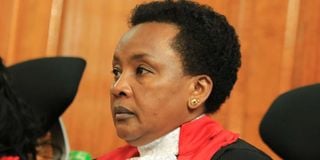Mwilu to sit in CJ interviews despite Murgor’s conflict-of-interest call

Deputy Chief Justice Philomena Mwilu.
What you need to know:
- DCJ’s advocate-client relationship with one of the candidates in the past won’t affect recruitment process.
- Unless something happens, all nine commissioners will sit through the process, says chief registrar.
Deputy Chief Justice Philomena Mwilu will sit on the interviewing panel this morning as the search for the next head of the Judiciary begins.
The Judicial Service Commission has disregarded conflict of interest protests by one of the applicants, setting the stage for the interviews.
The Chief Registrar of the Judiciary and Secretary to the JSC, Anne Amadi, yesterday confirmed that all the nine commissioners will be present for the interviews that kick off at 9am.
Former Director of Public Prosecutions Philip Murgor had written to the JSC requesting that Justice Mwilu sit the interview process out, arguing that she could be biased towards another applicant, Fred Ngatia.
In his letter, Mr Murgor argued that Justice Mwilu and Mr Ngatia have had an advocate-client relationship in the past, and that their history may trigger bias during the interviews.
Vetting of judges
Mr Ngatia represented Justice Mwilu in 2012 during the vetting of judges in line with the 2010 Constitution, which provided for weeding out of incompetent or rogue judicial officers whose actions could compromise the justice system.
Mr Murgor is also uncomfortable with the advocate-client relationship between Justice Mwilu and Law Society of Kenya (LSK) president Nelson Havi.
Mr Havi wrote a letter to the JSC protesting against the shortlisting of three candidates — Mr Murgor, Prof Patricia Kameri Mbote and Justice Martha Koome — whom he claimed were not suitable to serve as chief Justice.
But the Council of the LSK disputed the claim in a letter to the JSC, arguing that all three candidates have spotless record with the advocates’ lobby.
Mwilu controversy
The LSK council added that Mr Havi had no authority to pen his letter on behalf of the LSK, as he has been suspended pending the lobby’s Annual General Meeting.
The JSC has opted to ignore the controversy surrounding Justice Mwilu’s presence in the interviews. High Court Judge Said Chitembwe will be the first to face the panel.
State agencies
Kenyans who wish to raise issues on candidates still have an opportunity to present their concerns, as the JSC will accept such comments until the interview process is completed.
Ms Amadi said any comments of interest shall be taken into consideration after the JSC commissioners retreat to shortlist three candidates whose names shall be forwarded to the National Assembly for vetting.
“Unless something happens, all nine commissioners will sit through the interview process. We have received comments from members of the public and state agencies like the Kenya Revenue Authority, National Intelligence Service, Ethics and Anti-Corruption Commission, the LSK and others. All the comments will be taken into account in the selection process,” Ms Amadi said.
Retirement age
Under the law, the JSC nominates the best three candidates for the position of chief justice.
They are vetted by the National Assembly. If all three are found suitable to serve, their names are forwarded to the President who shall pick one.
The JSC will also be looking to fill in two slots of Supreme Court judge, following the retirement of Justice David Maraga and Jackton Ojwang who reached the mandatory retirement age of 70 in February 2020.
Prof Mbote will be interviewed on Tuesday, followed by Justice Koome, Justice Njagi Marete, Mr Murgor, Justice Nduma Nderi, Mr Ngatia, Justice William Ouko, Prof Moni Wekesa and Ms Alice Yeno Jepkoech.
Justice Maraga retired from the position of chief justice on January 12, 2021. He had served since October 19, 2016.





